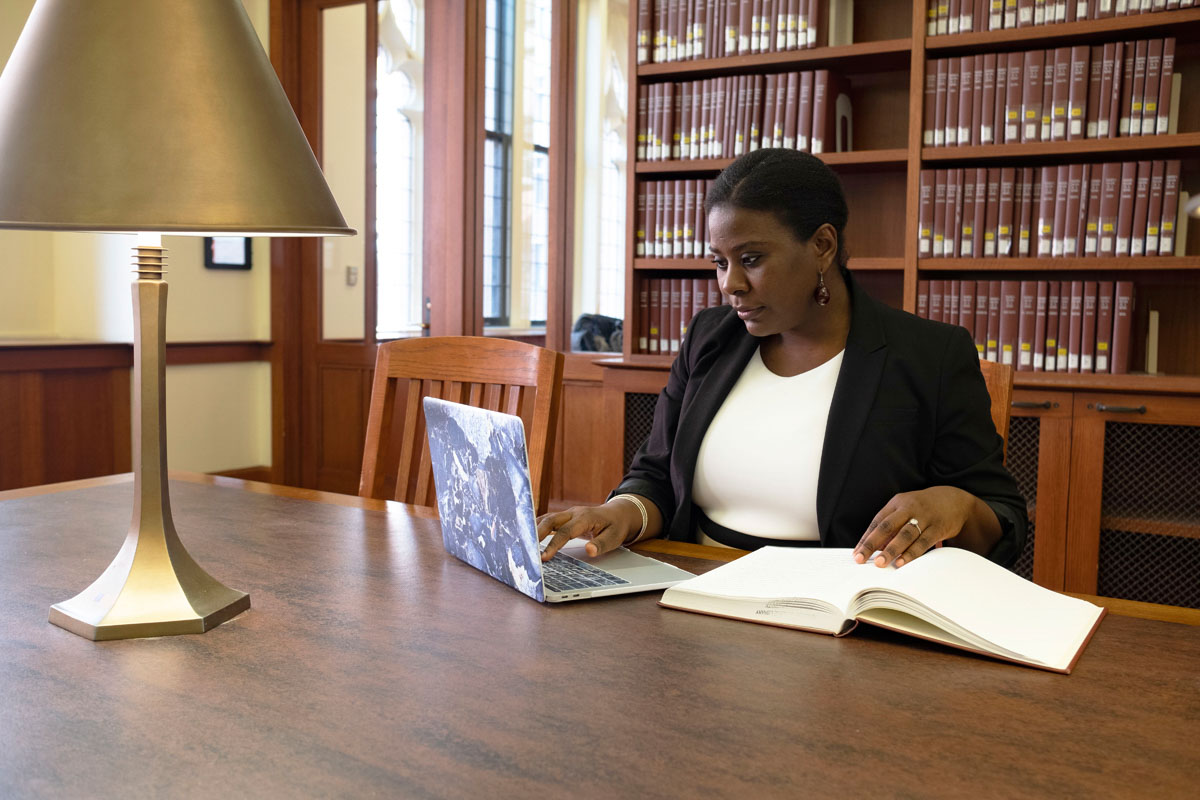Master of Education in School Psychology
Our National Association of School Psychologists (NASP)-accredited Master of Education (Ed.M.) program stresses a firm grounding in the core areas of psychology, as well as in the tools traditionally used by school psychologists to apply their knowledge and skills to school settings.
Completion of the 69-credit Ed.M can lead to certification as a school psychologist in New York State. Our students are also eligible for certification as a Board Certified Behavior Analyst (BCBA) in addition to the Licensed Behavior Analyst (LBA). For the BCBA, students need to enroll in 7 additional courses, but may use practicums throughout the semester and/or summer to start accruing hours. For more information, contact Dr. Jessica Dudek, js408@tc.columbia.edu; 914-552-0177.
Students interested may also add a New York - Bilingual Extension to their degree while enrolled at Teachers College by passing the NYS proficiency exam in a language other than English, taking one additional course, and completing their internship under the supervision of a certified school psychologist who has the bilingual extension.

Fieldwork Experiences
Ed.M. students should plan on three years of full-time attendance, including summers. Although part-time attendance is possible, full-time attendance leads to a richer educational experience. Ed.M. students must be available to spend a minimum of one full day per week for practica in their first year and two full days per week for fieldwork in their second year. Internships are full-time.
Students spend an average of 1 day per week in assissment practica for both semesters. These practica take place in the Center for Educational and Psychological Services at Teachers College.
Students spend two days per week in fieldwork for both semesters at one of the schools associated with our program. Fieldwork is a minimum of 600 hours over the academic year.
Students work in a school-based internship with a certified school psychologist for a minimum of 1200 hours.
For more detailed information about our program, please download our Student Handbook.

Admission Information
Displaying requirements for the Spring 2025, Summer 2025, and Fall 2025 terms.
Master of Education
- Points/Credits: 69
- Entry Terms: Fall
- Enrollment Formats: Full-Time Campus-Based
Certification
View Public Disclosure Notification
- NY State Provisional: School Psychology
Application Deadlines
| Entry Term Available | Priority Deadlines | Final Deadlines | Extended Deadlines |
|---|---|---|---|
| Spring | N/A | N/A | N/A |
| Summer | N/A | N/A | N/A |
| Fall | January 15, 2025 | April 1, 2025 | N/A |
Select programs remain open beyond our standard application deadlines, such as those with an extended deadline or those that are rolling (open until June or July). If your program is rolling or has an extended deadline indicated above, applications are reviewed as they are received and on a space-available basis. We recommend you complete your application as soon as possible as these programs can close earlier if full capacity has been met.
Application Requirements
| Requirement | |
|---|---|
| Online Degree Application, including Statement of Purpose and Resume | |
| Transcripts and/or Course-by-Course Evaluations for all Undergraduate/Graduate Coursework Completed | |
| Results from an accepted English Proficiency Exam (if applicable) | |
| $75 Application Fee | |
| Two (2) Letters of Recommendation | |
| Academic Writing Sample | |
| Supplemental application required (included in online application) | |
| Interview (phone, video, or in-person) required | |
| At least one (1) letter of recommendation should be academic |
For admission-related inquiries, please contact HAEPadmission@tc.columbia.edu.
Requirements from the TC Catalog (AY 2024-2025)
Displaying catalog information for the Fall 2024, Spring 2025 and Summer 2025 terms.
Master of Education (Ed.M., 69 points)
Master of Education-Regular Track (Ed.M., 69 points)
Our National Association of School Psychologists (NASP)-accredited Master of Education program requires 69 points of coursework. The course of study stresses a firm grounding in the core areas of psychology, especially cognitive psychology, as well as in the tools traditionally used by school psychologists to apply their knowledge and skills to school settings. Completion of the Ed.M. program in School Psychology can lead to certification as a school psychologist in New York State.
Ed.M. students should plan on three years of full-time attendance, including summers. Although part-time attendance is possible, full-time attendance leads to a richer educational experience. Ed.M. students must be available to spend a minimum of one full day per week for practica in their first year and two full days per week for fieldwork in their second year. Internships are full-time.
(The fieldwork sequence conforms to the calendar of our cooperating schools, NOT to the Teachers College academic calendar.)
Suggested sequence of courses by year and semester:
First Year
Fall (15 credits)
-
HBSK 5320 3 Individual Psychological Testing I: Cognitive Assessment
-
HBSK 5321 3 Individual Psychological Testing II: Socioemotional Assessment
-
HBSK 4030 3 Multicultural Issues in School Psychology
-
HBSK 4073 3 Childhood Disorders
Spring (15 credits)
-
HBSK 6380 3 Psychoeducational Assessment of Culturally Diverse Students
-
HBSK 5378 3 Psychoeducational Assessment of School Subject Differences
-
HBSK 5050 3 Behavioral Interventions
-
HBSK 5199 3 Mental Health Interventions at Tier 1
-
BBS 5068/5069 3 Brain and Behavior I*
Summer (6 credits)
Session A
-
HBSS 6100 3 Measurement and Program Evaluation
Session B
Second Year
Fall (13 credits)
-
HBSK 5280 4 Fieldwork
-
HBSK 6382 3 Mental Health Interventions at Tiers II and III
-
HBSK 6584 3 Seminar: School Psychology Consultation
-
HBSK 5199 3 Academic Prevention and Interventions
-
Spring (13 credits)
-
HBSK 5280 4 Fieldwork
-
HBSK 6362 3 Group Practicum
-
HUDM 4122 3 Probability and Statistical Inference
-
HBSK 5031 3 Families and Systems Consultation
-
HBSK 4025 3 Professional and Ethical Functions of School Psychologists
Third Year
Fall & Spring (4 credits)
-
HBSK 5480 2 Internship Supervision (2 credits per semester)
In addition to the above courses, students take electives to reach 69 credits.
*Students take 3 credits total across BBS 5068 and BBS 5069
Master of Education-ABA Track (75-82 points)
In addition to our regular track, the Applied Behavior Analysis (ABA) track offers students the opportunity to obtain certification as a school psychologist and a license as a Behavior Analyst (LBA) in New York State, plus meet the requirements for certification as a Board Certified Behavior Analyst (BCBA) by earning a Certificate in Applied Behavior Analysis.
Suggested sequence of courses by year and semester:
First Year
Fall (16 credits)
-
HBSK 5320 3 Individual Psychological Testing I: Cognitive Assessment
-
HBSK 5321 3 Individual Psychological Testing II: Socioemotional Assessment
-
HBSK 4030 3 Multicultural Issues in School Psychology
-
HBSE 4015 3 Applied Behavior Analysis I
-
HBSE 4034 1 Practicum in ABA (1 credit)
-
HBSK 4073 3 Childhood Disorders
Spring (12 credits)
-
HBSK 5378 3 Psychoeducational Assessment of School Subject Differences
-
HBSK 6380 3 Psychoeducational Assessment of Culturally Diverse Students
-
HBSE 4034 0 Practicum in ABA (0 credits)
-
HBSE 4044 3 Methods I: Research Methods in Pedagogy, Curriculum, and management
-
HBSK 5199 3 Mental Health Interventions at Tier I
Summer (14 credits)
Session A (6 credits)
-
HBSE 4049 3 Professional and Ethical Issues in ABA
-
HBSS 6100 3 Measurement and Program Evaluation
Session B (8 credits)
-
HBSE 4048 3 Working with Families with Autism
-
BBS 5068 2 Brain & Behavior I
Second Year
Fall (17 credits)
-
BBS 5069 1 Brain and Behavior II
-
HBSK 5280 4 Fieldwork
-
HBSK 6382 3 Mental Health Interventions at Tiers II and III
-
HBSK 6584 3 Seminar: School Psychology Consultation
-
HBSE 4045 3 Methods 2: Curr/Ped Operations for Teaching
Spring (16 credits)
-
HBSK 5280 4 Fieldwork
-
HBSK 6362 3 Group Practicum
-
HBSE 4016 3 ABA II
-
HBSK 4025 3 Professional and Ethical Functions of School Psychologists
-
BBS 5068/5069 3 Brain and Behavior I*
-
HBSK 5031 3 Families and Systems Consultation
Summer (5 credits)
Session A
-
HUDM 4122 3 Probability and Statistical Inference
Session B
-
HBSE 4047 2 Record Keeping in ABA (online)
Third Year
Fall and Spring (4 credits)
-
HBSK 5480 2 Internship Supervision (2 credits per semester)
*Students take 3 credits total across BBS 5068 and BBS 5069